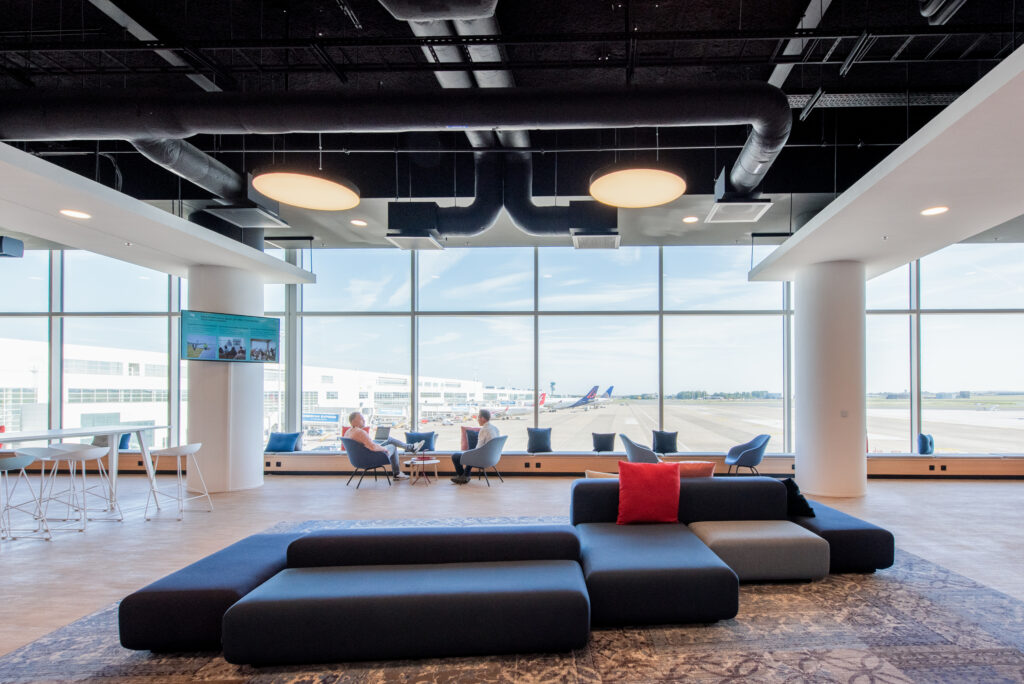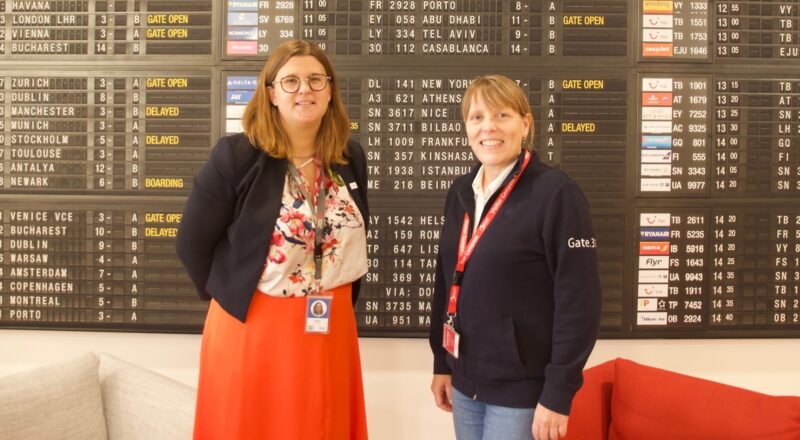Around the corner from the departures hall, a short corridor leads to the entrance of Compass, Brussels Airport’s brand-new headquarters. Aircraft enthusiasts would be blown away by the breathtaking view over the airport’s apron.

Today, we are meeting with Korijn Defever, General Manager of Airport Intelligence, a new subsidiary of Brussels Airport.
Airport Intelligence, Brussels Airport’s consulting and software provider
In 2021, Brussels Airport created Airport Intelligence, whose activities are organized around three key activities: offering consultancy services, marketing the AOP software suite, and providing experts.
The consultancy activities focus on operational efficiency, security, and business continuity planning. “While operational efficiency is at the heart of our expertise, we also help airports manage emergency situations. Generally speaking, airports are prepared for emergencies (emergency planning); however, current European regulations require critical infrastructure operators to prepare an advanced business continuity plan: how to react in the event of fire, cyberattack, power failure, etc. Establishing such a plan is the best way to prepare for this type of event. We work with our clients to draw up the plan and put in place dedicated teams.”
“As far as providing personnel is concerned, we provide experienced profiles who work as interim managers within the aviation sector.”
AOP Software: On the way to total airport management
AOP is a software suite developed in-house by Brussels Airport teams and is the flagship product of Airport Intelligence. This tool makes it possible to collect and visualize data and information relating to airport flows and processes (passengers, baggage, and aircraft).
“Our ambition with AOP Software Suite is clearly total airport management. We aim to integrate every element: runway, terminal, and accessibility. In short, every element that can affect the punctual departure of an aircraft is integrated into AOP. For instance, we even monitor traffic on the Brussels ring road, public transport, etc. As soon as one link in the chain is disrupted, we assess the impact on the rest of the operations. AOP is an analysis, forecasting and simulation tool that enables us to foresee the disruptions and adopt proactive solutions with a view to customer satisfaction.”
… 10-15% ROI
“Thanks to AOP Software, Brussels Airport has been able to reduce its operating costs by 10 to 15%. For example, the airport has managed to balance the presence of resources according to expected activity levels, eliminating the risk of overstaffing during off-peak periods and understaffing during peak periods. It’s a win-win situation for the airport, its employees, and customers!”
Airport Intelligence is at the heart of Brussels Airport’s new strategy
With ‘SHIFT 2027,’ Brussels Airport Company intends to strengthen its position as a European hub, promote its sustainability objectives, and further diversify its activities by focusing on innovation and cooperation. “Creating the start-up Airport Intelligence is in line with the ‘SHIFT 2027’ strategy because we support airports with implementing these concepts, thus helping them become more sustainable (being more efficient is more sustainable!) – gearing cleaning and terminal lighting to the presence of travelers enables significant savings – and there are many examples both airside and landside.”
Finally, Airport Intelligence exemplifies Brussels Airport’s new strategy, which aims to further diversify its activities by focusing on innovation and cooperation. “Brussels Airport recently invested in JetPack, a company specializing in big data and artificial intelligence, and more recently in DronePort, which is dedicated to research, innovation, and market development in drones and advanced air mobility.”
What are the future challenges facing airports? And how do you intend to support airports in tackling these new challenges?
« Aviation and air transport are continuing to flourish, but airports are no longer able to expand by building terminals, runways, etc. At the same time, we are experiencing very difficult economic conditions. As well as recruitment difficulties. All that leads us to believe that airports will have to do ‘better with less;’ operational expertise will play a strategic role, and it will be imperative to make the best use of available resources. Furthermore, customer profiles are constantly evolving: travelers are increasingly connected, and they don’t understand why an airport isn’t able to predict certain phenomena when they themselves have access to a series of apps that inform them, in real time, of weather, traffic, social events, and so on. The airport of tomorrow will have to be even more predictive. And that’s what we’re working on! »

